Past projects posters
Our Praxis project teams each produce an academic poster at the end of their project. We’ve included some examples here:
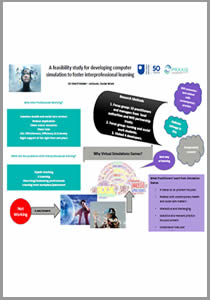
A feasibility study for developing computer simulation to foster interprofessional learning
A feasibility study for developing computer simulation to foster inter-professional learning
Dr Sharif Haider - Lecturer, Social Work
Why inter-professional working?
- Seamless health and social care services
- Reduce duplication
- Share scarce resources
- Share risks
- 3Es: Effectiveness, Efficiency & Economy
- Right support at the right time and place
What are the problems with inter-professional training?
- Dyadic teaching
- E-Learning
- Observing/shadowing professionals
- Learning from workplace/placement
It’s not working, so we need a way forward.
Why virtual simulation games?
Some reasons:
- Support students
- Confidence
- Immersive
- Challenging
- Safe
- Engaging
Research methods
- Focus group: 10 practitioners and managers from local authorities and NHS partnership trusts
- Focus group: Nursing and social work students
- Visited four developers
Headlines from focus group research:
“Students will remember and it is related to contemporary practice.”
“Definite mileage in this.”
“Desperately needed.”
“Best way of learning”
What practitioners want from simulation games
- It needs to be problem focused.
- Related with contemporary health and social care matters.
- Interactive and challenging.
- Selective and relevant practice focused content.
- Understand roles and responsibilities
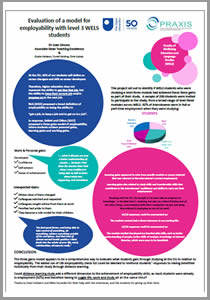
Evaluation of a model for employability with level 3 WELS students
Evaluation of a model for employability with level 3 WELS students
Dr Joan Simons Associate Dean Teaching Excellence
Elodie Vialleton, Tyrrell Golding, Chris Kubiak
Introduction
At the OU, 46% of our students self-define as career changers and 44% as career developers. Therefore, higher education does not represent the ability to get that first job, but the ability to keep their current job and/or progress on to the next job. Rich (2015) proposed a broad definition of employability as being the ability to “get a job, to keep a job and to get on in a job”. In response, Kellett and Clifton (2017) proposed a three gains model of employability, where students achieve personal gains, learning gains and working gains.
This project set out to identify if WELS students who were studying a level three module had achieved these three gains as part of their study. A sample of 200 students were invited to participate in the study, from a broad range of level three modules across WELS. 92% of interviewees were in full or part-time employment when they were studying. Of the students interviewed:
31% were modern languages students
27% were sports students
27% were health and social care students
15% were Early Years/Childhood students
Results
Work and personal gains
- Students developed: Confidence
- Self-esteem
- Sense of achievement
One student said, “What it did give me was a better understanding of people…. because I had done the courses that I had done, I was confident in being able to talk to them about what was happening, and transitions.”
Learning gains
Learning gains appeared to arise from specific module or course material that was relevant to the interviewee’s current employment Learning gains also related to study skills and transferrable skills that contribute to the interviewees’ confidence and ability to carry out their employment:
One student said,
‘Studying with the OU, the benefit is I’ve been able to progress my knowledge.. in the field that I’m studying, but also my critical thinking and all the other things, and analytical skills that I needed for my job, buy doing that without it impinging on any of my work’
14 out of 26 responses could be summarised as: The module content had a direct relevance to my working life. 12 out of 26 responses could be summarised as: The module studied developed my transferrable skills, such as better understanding of people, better skills of analysis, knowledge of relevant theories, which were seen to be beneficial.
Unexpected gains
- Others view of them changed
- Colleagues admired and respected them
- Colleagues sought advice from them at work
- Families had pride in them
- They became a role model for their children
One student said:
“The feel-good factor, and being able to take control of something, do something, achieve something outside of the workplace. And that kind of almost mental health position I think feeds into the whole of your life, work, relationships, all aspects really.”
Conclusion
The three gains model appears to be a comprehensive way to evaluate what students gain through studying at the OU in relation to employability. The added use of CBI employability check list could be deemed to reinforce students’ responses to having benefited holistically from their study through distance learning. Could distance learning study add a different dimension to the achievement of employability skills, as most students were already in employment (92%) and therefore having to juggle life, work and study all at the same time?
Thanks to Kate Fairbairn and Mike Snowden for their help with the interviews, and the students for giving up their time.
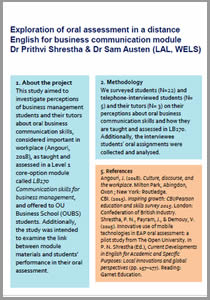
Exploration of oral assessment in a distance English for business communication module
Exploration of oral assessment in a distance English for business communication module
Dr Prithvi Shrestha & Dr Sam Austen (School of Language and Linguistics, Faculty of Wellbeing, Education and Language Studies)
About the projects
This study aimed to investigate perceptions of business management students and their tutors about oral business communication skills, considered important in workplace (Angouri, 2018), as taught and assessed in a Level 1 core-option module called LB170 Communication skills for business management, and offered to OU Business School (OUBS) students. Additionally, the study was intended to examine the link between module materials and students’ performance in their oral assessment.
Methodology
We surveyed students (N=22) and telephone-interviewed students (N= 5) and their tutors (N= 3) on their perceptions about oral business communication skills and how they are taught and assessed in LB170. Additionally, the interviewee students’ oral assignments were collected and analysed.
Findings
Oral business communication skills are crucial for both study and workplace, supporting CBI (2015) call.
In this respect, the module appropriately identifies and teaches various fundamental business communication skills (e.g., oral negotiation, presentations) for distance business management students.
The current design of assessment is perceived to be effective in assessing these oral business communication skills by both students and tutors.
However, both students and tutors suggest that more opportunities for oral assessment and practice would further enhance these skills, supporting previous research (Shrestha, Fayram, & Demouy, 2015).
There is also a concern about the lack of face-to-face opportunity for oral presentations despite one half-day school.
Although these concerns cannot be addressed for pedagogical reasons (e.g., module workload), a future redesign of the module may address them.
Student quote
‘I can only suggest to make this module a compulsory starting module to all business studies towards a degree as it allows you to build your skills in communication for business/academic purpose and with the skills I have gained here I would have done so much better in my previous module's assignments.’
References
Angouri, J. (2018). Culture, discourse, and the workplace. Milton Park, Abingdon, Oxon ; New York: Routledge. CBI. (2015). Inspiring growth: CBI/Pearson education and skills survey 2015. London: Confederation of British Industry. Shrestha, P. N., Fayram, J., & Demouy, V. (2015). Innovative use of mobile technologies in EAP oral assessment: a pilot study from The Open University. In P. N. Shrestha (Ed.), Current Developments in English for Academic and Specific Purposes: Local innovations and global perspectives (pp. 157–177). Reading: Garnet Education.
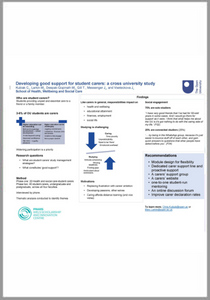
Student Carers - helping The OU student carers succeed
Student carers – helping The OU student carers succeed
Larkin M, Kubiak C, Vseteckova J, Deepak-Gopinath M, Messenger J
Introduction
Global demographic change means that more and more people will be a carer at some point in their lives and more and more people are likely to care more than once or be a ‘sandwich carer’ for both younger and older carers. That carers are often disadvantaged by caring (especially over the longer term) in relation to their health and wellbeing, finances, education, employment, and social life is well-documented. Policy changes and economic austerity mean that these disadvantages are likely to increase. Student carers are more likely than their peers to consider leaving study due to their caring responsibilities, the OU’s (2013) Equality Scheme emphasises that there is a need to better understand and support those experiencing such disadvantage. Building on a pilot project in Wales, this project is the first of two projects about how students who are carers shape a learning trajectory within the context of the other commitments in their lives.
Key aims
- Explore how students who are carers experience and manage OU study
- Provide a sound foundation for further University-wide research in this area.
- Explore how caring impacts on student carers, their goals and their student journey; other barriers to their study they might experience; the type of personal and organisational support they find helpful; their suggestions about further organisational support that would enable them to achieve and progress.
Methods and analysis
This qualitative study was carried out by 5 members of the Carer research Group between January and September 2019. Ethical approval was obtained from the Human Research Ethics Committee (HREC) and the Student Research Project Panel (SRPP). It involved hour-long semi-structured telephone (Skype for Business) interviews with a sample of 20 HWSC students. The data was analysed using an approach based on a combination of Framework analysis and Thematic analysis which involved the development of a thematic framework with codes to reflect key issues, concepts and themes. A frequency analysis of the codes was undertaken to identify the most commonly occurring.
Key findings and conclusions
The findings showed students who are carers: feel the OU offers them flexibility and affordability; find their OU studies are enjoyable, confidence building, a potential route to career enhancement and improve the care they provide; adopt coping strategies to manage their time, boundaries, and others in order to render caring as compatible as possible with study. One of the most significant findings was the continuation of the primacy of their caring role and identity throughout. Whilst they emphasised the OU’s existing support for carers has many strengths, those interviewed suggested it could be improved by investing in proactive support for student carers and developing more flexible modules (eg multiple options for tutorial sessions; removing examinations; building fallow periods into modules, providing ‘fast track’ reading routes). However, identifying further improvementsis complicated because some carers choose not to reveal their status as carers. This project lays the foundations for developing further understanding about the growing number of OU students who are carers, and contributes to HWSC scholarship about how personal challenges affect student study and retention. Follow-up interviews with the same students are planned in the second of this two-part study.
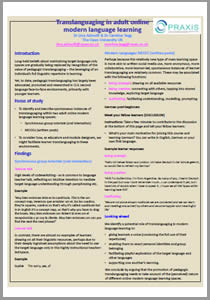
Translanguaging in adult online
Translanguaging in adult online modern language learning
Dr Lina Adinolfi & Dr Caroline Tagg, The Open University UK
Introduction
Long-held beliefs about maintaining target language only spaces are gradually being replaced by recognition of the value of pedagogic translanguaging – the leveraging of an individual’s full linguistic repertoire in learning. Yet, to date, pedagogic translanguaging has largely been advocated, promoted and researched in CLIL second language face-to-face environments, primarily with younger learners.
Focus of study
- To identify and describe spontaneous instances of translanguaging within two adult online modern language learning spaces:
- Synchronous group tutorials (oral interaction)
- MOOCs (written posts)
- To consider how, as educators and module designers, we might facilitate learner translanguaging in these environments.
Findings: Synchronous group tutorials (oral interaction)
Teacher talk
High levels of codeswitching - as is common to language teacher talk, reflecting an intuitive intention to mediate target language understanding through paraphrasing etc.
Example:
‘Muy bien entonces éste es la cuadrícula. This is the um concept map, tenemos que arrastrar um el, los los cuadros, they’re squares, cuadros so that’s why it’s called cuadrícula but in in English it’s a concept map, so that’s why you have to drag the boxes. Muy bien entonces um Robert tú eres um el recepcionista y yo soy la cliente. Muy bien entonces um can you find the next the next phrase?’
Learner talk
In contrast, there are almost no examples of learners drawing on all their linguistic resources, perhaps due to their deeply ingrained assumptions about the need to use the target language only in this highly instructional teacher[1]led space.
Example:
Sophie: ‘I’m sorry, yes, sí’
Findings: Modern Languages MOOC (written posts)
Perhaps because this relatively new type of mass learning space is more akin to written social media use, more anonymous, more collaborative, more learner-led, spontaneous instances of learner translanguaging are relatively common. These may be associated with the following functions:
- Being strategic: drawing on all available resources
- Being creative: connecting with others, tapping into shared knowledge, exploring target language
- Scaffolding: facilitating understanding, modelling, prompting
For example: German post beginners:
Meet your fellow learners (Discussion):
Instructions:
Take a few minutes to contribute to the discussion at the bottom of this page and tell your fellow learners:
- What’s your main motivation for joining this course and learning German? You can write in English, German or your own first language.
Example learner responses:
Being strategic:
‘Hallo Ich heisse Robyn aus London. Ich habe Deutsch in der Schule gelernt, so would like to refresh my German’
Being creative:
‘Hi!!! I'm Guillermina. I'm from Argentina. As many of you, I learnt Deutsch in the past but now I dont remember much...I can understand it yet, but I have lots of doubts when I have to speak it...I hope we all Viel Spass while learning have it!!!’
Scaffolding:
‘We are not alone einsam =solitude we are connected and we can learn and meeting( encounter) by others and become happier and meaningful life’
Looking ahead
We identify a potential role of translanguaging in modern language learning in:
- giving learners a voice (condoning the full use of their repertoires)
- enabling them to enact personal identities and group belonging
- facilitating playful exploration of the target language and other languages
- supporting one another’s learning
We conclude by arguing that the promotion of pedagogic translanguaging needs to take account of the (perceived) nature of different online modern language learning spaces
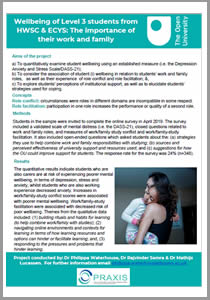
Wellbeing of Level 3 students from HWSC & ECYS The importance of their work and family
Wellbeing of Level 3 students from HWSC & ECYS: The importance of their work and family
Aims of the project
a) To quantitatively examine student wellbeing using an established measure (i.e. the Depression, Anxiety and Stress Scale/DASS-21)
b) To consider the association of student (i) wellbeing in relation to students’ work and family roles, as well as their experience of role conflict and role facilitation
c) To explore students’ perceptions of institutional support, as well as to elucidate students’ strategies used for coping
Concepts
Role conflict: circumstances where roles in different domains are incompatible in some respect.
Role facilitation: participation in one role increases the performance or quality of a second role.
Methods
Students in the sample were invited to complete the online survey in April 2019. The survey included a validated scale of mental distress (i.e. the DASS-21), closed questions related to work and family roles, and measures of work/family study conflict and work/family-study facilitation. It also included open-ended questions which asked students about the:
- strategies they use to help combine work and family responsibilities with studying
- sources and perceived effectiveness of university support and resources used
- suggestions for how the OU could improve support for students. The response rate for the survey was 24% (n=348)
Results
The quantitative results indicate students who are also carers are at risk of experiencing poorer mental wellbeing, in terms of depression, stress and anxiety, whilst students who are also working experience decreased anxiety. Increases in work/family-study conflict scores were associated with poorer mental wellbeing. Work/family-study facilitation were associated with decreased risk of poor wellbeing. Themes from the qualitative data included:
- building rituals and habits for learning (to help combine work/family with studies);
- navigating online environments and contexts for learning in terms of how learning resources and options can hinder or facilitate learning;
- responding to the pressures and problems that hinder learning.
Project conducted by: Dr Philippa Waterhouse, Dr Rajvinder Samra & Dr Mathijs Lucassen. For further information email philippa.waterhouse@open.ac.uk
![]()